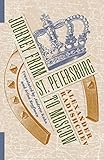Journey from St. Petersburg to Moscow / Alexander Radishchev.
Material type: TextSeries: Russian LibraryPublisher: New York, NY : Columbia University Press, [2020]Copyright date: ©2020Description: 1 online resource : No figuresContent type:
TextSeries: Russian LibraryPublisher: New York, NY : Columbia University Press, [2020]Copyright date: ©2020Description: 1 online resource : No figuresContent type: - 9780231185905
- 9780231546393
- 306.0947 23
- online - DeGruyter
| Item type | Current library | Call number | URL | Status | Notes | Barcode | |
|---|---|---|---|---|---|---|---|
 eBook
eBook
|
Biblioteca "Angelicum" Pont. Univ. S.Tommaso d'Aquino Nuvola online | online - DeGruyter (Browse shelf(Opens below)) | Online access | Not for loan (Accesso limitato) | Accesso per gli utenti autorizzati / Access for authorized users | (dgr)9780231546393 |
Browsing Biblioteca "Angelicum" Pont. Univ. S.Tommaso d'Aquino shelves, Shelving location: Nuvola online Close shelf browser (Hides shelf browser)

|

|

|

|

|

|

|
||
| online - DeGruyter Dust and Other Stories / | online - DeGruyter China's War on Smuggling : Law, Economic Life, and the Making of the Modern State, 1842-1965 / | online - DeGruyter Garden Variety : The American Tomato from Corporate to Heirloom / | online - DeGruyter Journey from St. Petersburg to Moscow / | online - DeGruyter From Da Ponte to the Casa Italiana : A Brief History of Italian Studies at Columbia University / | online - DeGruyter The Man Who Couldn't Die : The Tale of an Authentic Human Being / | online - DeGruyter Empowering the Great Energy Transition : Policy for a Low-Carbon Future / |
Frontmatter -- CONTENTS -- Acknowledgments -- Introduction -- Note on the Text -- A.M.K. -- 1. Departure -- 2. Sofia -- 3. Tosna -- 4. Lyubani -- 5. Chudovo -- 6. Spasskaya Polest -- 7. Podberezye -- 8. Novgorod -- 9. Bronnitsy -- 10. Zaitsovo -- 11. Kresttsy -- 12. Yazhelbitsy -- 13. Valdai -- 14. Edrovo -- 15. Khotilov: Project for the Future -- 16. Vyshny Volochok -- 17. Vydropusk -- 18. Torzhok -- 19. Mednoe -- 20. Tver -- 21. Gorodnya -- 22. Zavidovo -- 23. Klin -- 24. Peshki -- 25. Chornaya Gryaz -- Notes
restricted access online access with authorization star
http://purl.org/coar/access_right/c_16ec
Alexander Radishchev’s Journey from St. Petersburg to Moscow is among the most important pieces of writing to come out of Russia in the age of Catherine the Great. An account of a fictional journey along a postal route, it blends literature, philosophy, and political economy to expose social and economic injustices and their causes at all levels of Russian society. Not long after the book’s publication in 1790, Radishchev was condemned to death for its radicalism and ultimately exiled to Siberia instead.Radishchev’s literary journey is guided by intense moral conviction. He sought to confront the reader with urgent ethical questions, laying bare the cruelty of serfdom and other institutionalized forms of exploitation. The Journey’s multiple strands include sentimental fictions, allegorical discourses, poetry, theatrical plots, historical essays, a treatise on raising children, and comments on corruption and political economy, all informed by Enlightenment arguments and an interest in placing Russia in its European context. Radishchev is perhaps the first in a long line of Russian writer-dissenters such as Herzen and Solzhenitsyn who created a singular literary idiom to express a subversive message. In Andrew Kahn and Irina Reyfman’s idiomatic and stylistically sensitive translation, one of imperial Russia’s most notorious clandestine books is now accessible to English-speaking readers.
Mode of access: Internet via World Wide Web.
In English.
Description based on online resource; title from PDF title page (publisher's Web site, viewed 25. Jun 2024)


